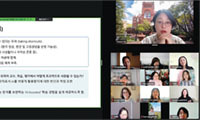
Maria Schaad, working in her home office in Germany, says: ‘‘Having children means you have to make compromises’’ at work.
By SARAH PLASSFRANKFURT - Maria Schaad, an ambitious 41-year-old businesswoman, considers herself lucky. After the birth of each of her sons, now 7 and 3, her employer, a major pharmaceutical company, allowed her to work flexible, reduced hours - a perk that is far from a given in Germany.
But her luck extended only so far: though Ms. Schaad had once set her sights on a position in management, her career stagnated after she started a family, she said, even though she had earned an M.
B.A. after she became a mother.
“At some point, women have to make a decision,” she said matter-of-factly. “Having children means you have to make compromises” at work.
Millions of working mothers - and sometimes fathers - have to make often difficult trade-offs when it comes to work and family, but labor experts say the calculus is especially harsh in Germany, a country that despite having a woman chancellor and sitting at the center of supposedly liberal Europe, has one of the widest gender wage gaps on the Continent.
Only Cyprus, Estonia and Slovakia have equal or greater gaps, according to a study by the European statistics service, Eurostat.
Across the Continent, women on average made 15.9 percent less than men in 2007. That gap has narrowed each year since 2001, when women made 20.4 percent less than men, according to a report by the European Union foundation that has studied the trend for years.
The wage difference in Germany is just one of the disparities between working men and women, especially mothers, that government and union leaders say are creating a drag on female participation in the work force and, consequently, on economic growth, at a time when Germany may be teetering on the edge of recession.
Since 2000, German working women on average have gone from earning 26 percent less than men to making 24 percent less than men in 2006, the last year for which statistics are available, according to data provided by the government statistics bureau, Destatis.
Ingrid Sehrbrock, deputy chairwoman of the German Federation of Trade Unions, calls German pay inequity a “scandal.” Europe’s commissioner for employment and social affairs, Vladimir Spidla, recently called on German employers “to really apply the principle of equal pay for equal work.”
New data suggests that Germany is going in the opposite direction. While the wage gap between women and men is narrowing across the European Union and in the United States, it is stagnant in Germany.
There are many reasons that Germany has continually been in the European cellar. Outright gender discrimination is one, researchers say. Maternity leave is another: men get promoted while their female colleagues take time off to have children.
“The dilemma is that while 50 percent of the junior employees are female, they pretty much disappear on their way to middle management,” said Heiner Thorborg, a human resources consultant in Frankfurt and a vocal critic of gender inequality.
But there are also societal and policy pressures. For example, mothers who work are sometimes derided as Rabenmutter, or “raven mothers.” The phrase - based on the erroneous belief that ravens fly away, leaving their nests behind - refers to women who pursue careers instead of being homemakers.
Silke Strauss, 42, said she could not have attained her present position had she decided to have children. She was just named managing partner of a management consulting firm, and is the only female partner among eight men. “It would simply not work with children, not with the amount of flexibility that is expected,” she said.
Ms. Schaad said young women who want both a career and children had better hurry. In business, she said, “Realistically, a woman who has not made it by 40 has no chance to make it at all.”
독일 여성들응 월급 불균형에 직면해 있다
프랑크푸르트- 야심찬 41세 비즈니스 여성인 마리아 쉬아드는 자신이 운이 좋다고 생각한다. 7세와 3세가 된 두 아들을 출산한 이후에도 대형 조제 회사인 그녀의 직장은 그녀가 줄어든 근무시간으로 유동적으로 일할 수 있도록 허가했다-독일에서는 주어지기 힘든 상여금이다.
그러나 그녀의 행운은 여기까지만 이어졌다. 쉬아드씨가 매니지먼트 직위에 눈독을 들였지만, 그녀에 따르면 가정을 가진 이후로는 엄마가 된 뒤 MBA 학위를 이수했음에도 불구하고 그녀의 커리어는 그 자리에서 정체됐다.
“어느 시기에 다다르면 여성은 결정을 해야합니다” 그녀가 현실적인 문제에 대해 말했다. “자녀를 갖는 것은 당신이 직장에서 타협해야 한다는 것을 의미합니다”
수백만명의 일하는 엄마들-어떤 경우에는 아빠들-은 일과 가정에 관해서 어려운 거래를 자주 해야 한다-그러나 노동 전문가들은 독일에서 이를 계산하는 것은 특히나 가혹한 일이라고 말하는데, 독일은 여성 대법원장이 있고 자유의 상징인 유럽 중심에 위치함에도 불구하고 유럽대륙에서 남녀 월급의 차이가 가장 큰 나라다.
유럽 통계 서비스인 유로스타트에 따르면 사이프러스와 에스토니아, 슬로바키아만이 유사하거나 더 큰 차이가 있다.
유럽대륙 전역에서 지난 2007년 여성들은 남성보다 평균적으로 15.9% 더 적은 액수의 월급을 받았다. 몇 년에 걸쳐 이같은 경향을 연구해 온 유럽인 유니온 기구에 따르면 이 같은 차이는 여성이 남성보다 20.4%나 더 적은 액수를 벌던 지난 2001년 이후로 좁혀져온 것이다.
독일내 이 같은 월급의 차이는 일하는 남성과 여성, 특히 엄마들 사이의 차별현상 중 하나로, 정부와 유니온 지도자들은 이들 일하는 여성들은 직장내 여성의 참여도를 끌어가고 있으며 또한 독일이 불경기로 인해 동요할 때 결과적으로 경제성장을 이끌어 온 주역들이라고 말한다.
정부 통계 기관인 데스타티스가 공개한 자료에 따르면 2000년 이후, 독일의 일하는 여성들은 평균적으로 남성보다 26% 적게 벌었으며 통계가 나온 마지막해인 지난 2006년 남성들보다 24% 적은 액수를 벌었다.
독일 트레이드 유니온 연맹의 부회장인 인그리드 셔브록은 이같은 독일의 불공평한 지급 현상을 일종의 ‘스캔달’이라고 말한다. 유럽내 고용과 사회적 공공사업 위원인 블라디미르 스피들라는 최근 독일 고용주들에게 “동일한 업무에 동일한 월급을 지급하는 원칙을 실제적으로 적용할 것”을 종용했다.
새로운 자료는 독일이 반대 방향으로 가고 있다고 지적한다. 유럽 연맹국과 미국에서 여성과 남성의 월급차이가 점차 좁혀지는 반면, 독일에서는 정체돼 있다는 것이다.
독일이 유럽의 최하위인데는 많은 이유가 있다. 연구자들은 노골적인 성차별도 그중 하나라고 말한다. 출산휴가도 또 하나의 이유다: 남성들은 그들의 여성 동료들이 자녀를 갖기 위해 쉬는 동안 승진된다.
“말단 사원 중 50%가 여성이지만 매니지먼트 급 중간 사원으로 가는 도중 여성들이 대부분 사라지는 것이 바로 딜레마입니다” 프랑크푸르트의 인사 컨설턴트이자 성차별에 관한 비판자인 헤이너 토르보그가 말했다. 그러나 사회적 또한 정치적 압력도 있다. 예를 들어 일하는 엄마들은 가끔씩 ‘라벤무터’, 혹은 ‘까마귀 엄마’라고 불리는데 이 말은-까마귀들이 그들의 둥지를 내팽개치고 날아가 버린다는 근거 없는 믿음에서 기인한 것으로-가정을 꾸리기보다는 커리어를 추구하는 여성들을 일컫는 것이다.
42세의 실케 스트라우스는 그녀가 자녀들 갖기로 결심했다면 오늘날의 자리에 오르지 못했을 것이라고 말했다. 그녀는 최근 매니지먼트 컨설팅 법인의 파트너로 승진했는데, 8명의 파트너 중 여성은 그녀 혼자다. “아이들을 키우면서는 전혀 이룰 수가 없어요. 아이를 키우기 위해 유동적으로 일하면서는 말이죠” 그녀가 말했다.
쉬아드씨는 커리어와 자녀를 모두 원하는 젊은 여성들이라면 서두르는 것이 좋을 것이라고 조언했다. 비즈니스에서는 “현실적으로 말하자면, 40세 이전까지 원하는 목표에 다르지 않으면 앞으로 그것을 이룰 수 있는 기회는 전혀 없습니다”라고 그녀가 말했다.
<사라 플라스 기자>
<어휘해설>
▲stagnant: 고여있는, 흐르지 않는, 침체해있는, 부진한, 불경기의
▲perk: 상여금, 임시수입, 초과이득, 부수입
▲trade-off: 거래
▲cellar: 최하의, 꼴찌
▲teeter: 동요하다. 아래 위로 흔들다.
▲deride:~을 비웃다, 바보 취급하다
▲erroneous: 잘못이 있는, 잘못에 기인한, 잘못된, 근거 없는
스마터리빙
more [ 건강]
[ 건강]이제 혈관 건강도 챙기자!
[현대해운]우리 눈에 보이지 않기 때문에 혈관 건강을 챙기는 것은 결코 쉽지 않은데요. 여러분은 혈관 건강을 유지하기 위해 어떤 노력을 하시나요?
 [ 건강]
[ 건강]내 몸이 건강해지는 과일궁합
 [ 라이프]
[ 라이프]벌레야 물럿거라! 천연 해충제 만들기
 [ 건강]
[ 건강]혈압 낮추는데 좋은 식품
[현대해운]혈관 건강은 주로 노화가 진행되면서 지켜야 할 문제라고 인식되어 왔습니다. 최근 생활 패턴과 식생활의 변화로 혈관의 노화 진행이 빨라지고
사람·사람들
more많이 본 기사
- 쿠팡 유출 한달 만에 용의자 특정…동기·2차피해는 여전히 베일
- 우크라, 성탄절에 드론·英미사일로 러 에너지시설 공격
- 교황, 첫 성탄 메시지서 “우크라전 종전 직접 대화할 용기 찾길”
- 맘다니 뉴욕시장 취임위원회에 ‘파친코’ 이민진 작가
- “여객기서 빈대 물렸다” 美·유럽 항공사 상대 억대 손배소
- 트럼프 얹은 케네디센터 개명 싫어 연례 성탄콘서트 취소
- 이스라엘군 “레바논서 이란 정예부대 군인 사살”
- 여성 살해·자녀 납치 한인 ‘수배’
- 남가주 전역에 ‘물폭탄’… 성탄 연휴 ‘대혼란’
- “소변 불편한데 주저하다 방광 망가져”
- SF기독대학교’동문의 밤’
- 러 “푸틴, 트럼프에 ‘메리 크리스마스’…젤렌스키는 야만적”
- 체포 불체자 수만명 물류창고에 수감 추진
- 북가주목회자 사모회 총회
- ‘라스베가스에서 만난 한인들’
- 트럼프, 성탄절 어린이들과 통화… “나쁜 산타 막을게”
- 한인타운 한복판 주유소서 강도 ‘칼부림’
- [2025년 한 해 ‘진 별’들] 미주 한인사회 원로들 ‘역사의 뒤안길’로
- “마가, 유럽에 첫 공격”…표현의 자유 둘러싼 전쟁 시작됐나
- 새해 더 건강해지기 위한 의사의 과학적 조언 10가지
- “대학 학자금 상환 안하면 임금 압류한다”
- VA 페어팩스 카운티 실업자 급증
- 한국외대·연세대·한양대 GCEO 연합골프대회 성황
- “한반도 평화정착에 앞장선다”
- “음주운전 대신 15불 할인하는 리프트 타세요”
- 난방기 뜯자 ‘비밀공간’ 은신 마피아 보스 체포
- 워싱턴 총신동문회, 새 회장에 김찬영 목사
- 상록회 “한 해 동안 함께여서 행복했습니다”
- “불교계 화합과 차세대 육성 축제”
- CBS가 보류한 ‘불법체류자 추방’ 보도, 캐나다서 원본 유출
- 봉사 가치 되새기고 발전 방안 모색
- “부드럽고 약한 것이 강한 것 이긴다”
- 월드미션칼리지 장학금 수여식
- 레저월드 홀인원 골프클럽 송년모임
- 피클볼이 바꾸는 부동산의 얼굴
- 북한인, 아마존 위장취업 대거 적발
- “예수님 평화가 온 세상에”
- 성탄 메시지
- 서태지, 딸·엘리와 1년 만에 근황 “좋은 소식 없어 안타까워”
- 테슬라, “비상사태 시 차문 안 열려”
- 한인 박찬영씨 총격살해범은 백인 군인...살해범 “박씨 차량이 끼어들어 시비가 붙어 결국 총쐈다”
- “아름답게 장식하세~”… 청소년재단 특별수업
- H-1B ‘10만 달러 수수료’ 연방법원, 이의소송 기각
- 원·달러 환율, 당국 개입에 42원 폭락
- 국기원 MD지부, 고단자 심사 실시
- 황해도민회 석경회 송년모임
- 바야흐로 ‘귀금속 시대’… 금·은·구리까지 사상 최고
- “크리스마스의 참된 의미”
- 선우용여 “아들, 돈 없어 개밥 먹기도..아파트 마련해줬다”
- 트럼프 ‘전쟁할 결심’?… 미군 특수부대 카리브해 이동
1/5지식톡

-
 미 육군 사관학교 West Poin…
0
미 육군 사관학교 West Poin…
0https://youtu.be/SxD8cEhNV6Q연락처:wpkapca@gmail.comJohn Choi: 714-716-6414West Point 합격증을 받으셨나요?미 육군사관학교 West Point 학부모 모…
-
 ☝️해외에서도 가능한 한국어 선생님…
0
☝️해외에서도 가능한 한국어 선생님…
0이 영상 하나면 충분합니다!♥️상담신청문의♥️☝️ 문의 폭주로 '선착순 상담'만 진행합니다.☎️ : 02-6213-9094✨카카오톡ID : @GOODEDU77 (@골뱅이 꼭 붙여주셔야합니다…
-
 테슬라 자동차 시트커버 장착
0
테슬라 자동차 시트커버 장착
0테슬라 시트커버, 사놓고 아직 못 씌우셨죠?장착이 생각보다 쉽지 않습니다.20년 경력 전문가에게 맡기세요 — 깔끔하고 딱 맞게 장착해드립니다!장착비용:앞좌석: $40뒷좌석: $60앞·뒷좌석 …
-
 식당용 부탄가스
0
식당용 부탄가스
0식당용 부탄가스 홀세일 합니다 로스앤젤레스 다운타운 픽업 가능 안녕 하세요?강아지 & 고양이 모든 애완동물 / 반려동물 식품 & 모든 애완동물/반려동물 관련 제품들 전문적으로 홀세일/취급하는 회사 입니다 100% …
-
 ACSL 국제 컴퓨터 과학 대회, …
0
ACSL 국제 컴퓨터 과학 대회, …
0웹사이트 : www.eduspot.co.kr 카카오톡 상담하기 : https://pf.kakao.com/_BEQWxb블로그 : https://blog.naver.com/eduspotmain안녕하세요, 에듀스팟입니다…
케이타운 1번가
오피니언
 스티브 강 전 한인민주당협회 회장
스티브 강 전 한인민주당협회 회장 [스티브 강 ‘인사이드 미국’] 2026 중간선거: 트럼프 지지율 하락이 말해주는 것
 김홍일 케이유니콘인베스트먼트 대표
김홍일 케이유니콘인베스트먼트 대표 [기고] 안정의 기준은 어떻게 제도가 되었나
 유혜미 한양대 경제금융대학 교수
유혜미 한양대 경제금융대학 교수 [유혜미 칼럼] 치솟는 환율, 경제 지표의 역설
 성민희 소설·수필가
성민희 소설·수필가 [윌셔에서] 우리 안의 ‘생각하는 사람’을 깨울 시간
 김정곤 / 서울경제 논설위원
김정곤 / 서울경제 논설위원 [만화경] 해수부 부산시대

[왈가 왈부] 내란재판부·정통망법 또 수정… 졸속·땜질 아닌가요
 정숙희 논설위원
정숙희 논설위원온라인쇼핑과 반품, 그리고 그 이후
 파리드 자카리아 / 워싱턴포스트 칼럼니스트 / CNN ‘GPS’ 호스트
파리드 자카리아 / 워싱턴포스트 칼럼니스트 / CNN ‘GPS’ 호스트 트럼프의 새 독트린 “미국을 다시 왜소하게”
 김동찬 시민참여센터 대표
김동찬 시민참여센터 대표 [미국은 지금] MAGA의 분열, 예견된 균열의 시작
1/3지사별 뉴스

“온 세상에 평화를⋯”
숨가쁘게 달려온 2025년을 이제 1주일 남짓 남긴 채 크리스마스 이브를 맞는다. 다사다난했던 한 해를 되돌아보며 마무리하는 연말 시즌과 크리…
H-1B비자 고임금·경력자에 우선권

“한반도 평화정착에 앞장선다”
민주평화통일자문회의 미주지역회의(부의장 이재수)는 22일 기자회견을 통해 내년도 활동 방향과 목표를 밝혔다. 이재수 부의장은 “미주지역회의는…
VA 페어팩스 카운티 실업자 급증

한인들 위한 무료 법률 상담회 개최
샌프란시스코 베이지역 한인회(회장 김한일)는 지난 20일 한인회관에서 북가주 지역 한인들을 위한 무료 법률 상담회를 개최했다. 이날 행사에는 …
여성 살해·자녀 납치 한인 ‘수배’

오늘 하루 이 창 열지 않음 닫기 





















































.png)


댓글 안에 당신의 성숙함도 담아 주세요.
'오늘의 한마디'는 기사에 대하여 자신의 생각을 말하고 남의 생각을 들으며 서로 다양한 의견을 나누는 공간입니다. 그러나 간혹 불건전한 내용을 올리시는 분들이 계셔서 건전한 인터넷문화 정착을 위해 아래와 같은 운영원칙을 적용합니다.
자체 모니터링을 통해 아래에 해당하는 내용이 포함된 댓글이 발견되면 예고없이 삭제 조치를 하겠습니다.
불건전한 댓글을 올리거나, 이름에 비속어 및 상대방의 불쾌감을 주는 단어를 사용, 유명인 또는 특정 일반인을 사칭하는 경우 이용에 대한 차단 제재를 받을 수 있습니다. 차단될 경우, 일주일간 댓글을 달수 없게 됩니다.
명예훼손, 개인정보 유출, 욕설 등 법률에 위반되는 댓글은 관계 법령에 의거 민형사상 처벌을 받을 수 있으니 이용에 주의를 부탁드립니다.
Close
x